It is eleven months since I raised concerns about the implications of the police charging two hillwalkers at Crianlarich with Culpable and Reckless Conduct (see here). In January, two women from Fife were charged with the same offence after they had called the mountain rescue on Ben Lomond (see here). Now the police have charged two men with Culpable and Reckless Conduct after being rescued from Finnich Glen (see here). The implications for access rights, outdoor recreation and mountain rescue are serious.
Culpable and reckless conduct is a very serious common law offence. Up until last year it was used by the police to charge people whose actions could cause death to others, such as by dropping traffic cones off bridges or having unprotected sex when infected with a disease like HIV. In other words actions where a person is clearly endangering the lives of others. While the full facts behind the rescue are not public, the Stirling Observer reported that the two men “had become stranded beneath the road bridge section” and were then winched out as part of “a technical rope rescue”. That is core business for mountain rescue team members and one which they are fully trained to do safely. There are reasons therefore to be seriously concerned about why the two men were charged with culpable and reckless conduct in this case. Who were they endangering apart from themselves?
A few days later a man and a daughter were also extracted from the gorge by a “technical rope rescue” in what appears to have been similar circumstances (see here). Thankfully, they weren’t charged with any offence, but what was the difference between what they did and the two men? Both got stuck. The Daily Record article refers to the two men being “ill-prepared for the conditions”, but weren’t the man and the daughter equally ill-prepared?
In any case, being ill-prepared is not the same as being reckless.
Moreover, there are serious implications if we confuse a person recklessly endangering their own life with recklessly endangering that of others. A third accident in Finnich Glen in the last two weeks involved a man falling down the gorge sustaining serious injuries. Should Police Scotland have charged him with culpable and reckless conduct after he had been rescued and taken to hospital?
It is worth noting here that when people “recklessly” disregard their own safety to help others they are usually regarded as brave and often described as heroes or heroines. A tragic example is the two men who recently jumped into the freezing Thames to try and save a woman who had fallen from a bridge (see here). Do Police Scotland want to stop people doing that?
A key tenet of Mountain Rescue in Scotland up until now has been not to blame people needing rescued, however ill-prepared or foolish they may appear. There are both practical and philosophical reasons for that stance.
The practical reason is that if people are blamed or shamed publicly, there is likely to be a knock-on effect ion people who find themselves in similar situations. The two parties who called the Mountain Rescue when stuck in Finnich Glen did absolutely the right thing, they stopped and called for help rather than getting themselves into further difficulties. But would the two men have done the same if they had known they would be charged with a very serious criminal offence? How many more cases before the general public gets the message and decides not to call the rescue in case they are charged? To the best of my knowledge until last year no-one has been charged with Culpable and Reckless Conduct because they called out the mountain rescue.
The philosophical reasons for not blaming people who call the mountain rescue are equally important. The desire to explore is an inherent part of childhood and the desire to pit oneself against the natural environment a fundamental part of the human condition, even if both these instincts are now generally beaten out of many people as they grown up.
It should not surprise us, however, that having found or been directed to places like Finnich Glen by social media, people want to take a closer look. In doing so there is a fine line, which is very easy to overstep, between being in control and getting into difficulty. Two steps and a person may be unable to reverse a route which appeared perfectly safe to them up until that moment. People can only develop understanding and judgement about where that line lies for them through experience. Now Police Scotland is raising serious criminal charges against people for daring to test their experience. The implications for human liberty and people’s ability to exercise access rights in Scotland are far-reaching. At stake is whether the police have the right to limit where people go and what they do in the countryside.
Stirlingshire police and the Loch Lomond and Trossachs National Park Authority
All three of these Culpable and Reckless Conduct charges have been levied by the Stirlingshire division of Police Scotland. That, as I stated in my post in January, is not a coincidence:
“For six years now the Loch Lomond and Trossachs National Park Authority, which has a statutory duty to promote public enjoyment of the countryside, has been doing the opposite, blaming, controlling and penalising people who want to do outdoor recreation. Working in “partnership” with police and local authorities they have created a toxic culture in which use of the criminal law to manage people enjoying the countryside has become the preferred visitor management option.”
That toxic culture was demonstrated the weekend before last by the large number of parking fines issued by Stirling Police to people trying to visit beauty spots (see here).
Public Authorities in the Stirling area did almost nothing to improve visitor infrastructure for the anticipated surge in Covid visitors post lockdown. Instead of paying farmers to open up fields to allow for extra parking, the LLTNPA Chief Executive has used the £960k of government funding his Board failed to allocate on recruiting more managers (see here).
Finnich Glen is only just outside the National Park boundary. After the surge of visitors there last year, which resulted in Stirling Council temporarily passing a legal order to exempt the area from access rights (see here), the LLTNPA became involved in advising how to manage access there. It should come as no surprise that, instead of making it easier for the thousands of people who wanted to see the gorge as a result of the Outlander series, as a result of their advice Stirling Council and Stirling district of Police Scotland made it more difficult.
The failure to provide appropriate visitor infrastructure at Finnich Glen
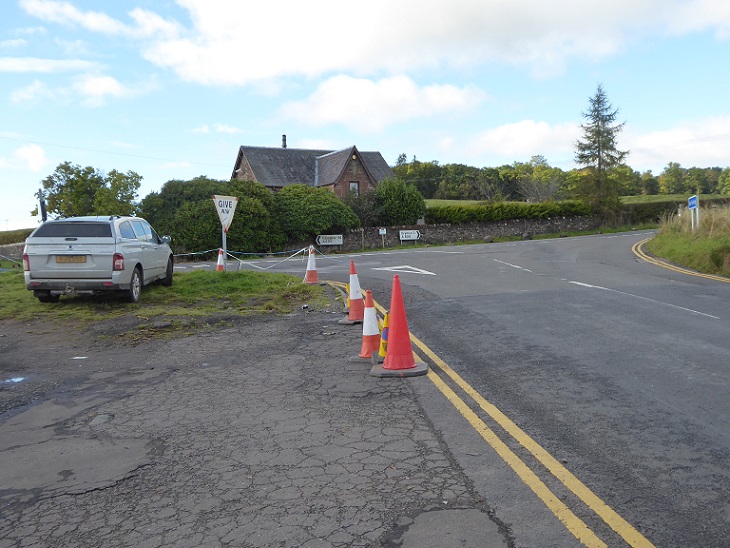
The parking area at Finnich Glen is small and can maybe take ten cars at most. That was adequate so long as one of the natural wonders of the Glasgow area was only known to a few people. It became hopelessly inadequate after Outlander was filmed there. People started parking on the main Glasgow-Drymen Road but, instead of creating extra parking and improving the access infrastructure, Stirling Council responded by imposing a clearway and painting the road with double yellow lines.
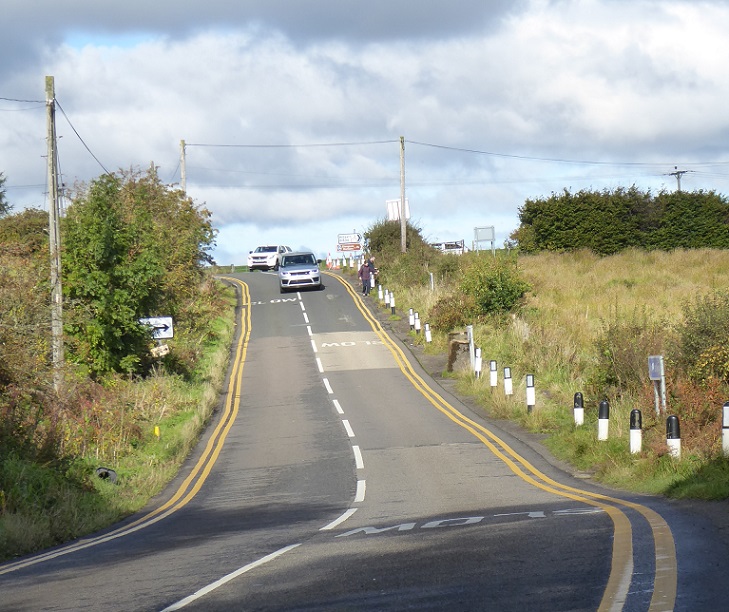
While addressing the safety risks to cars, nothing was done to address the safety risks to pedestrians.
Currently the only viewpoint for Finnich Glen which is safe from natural hazards is at the road bridge. There is no signage of how to access this from the car park without walking down the road.
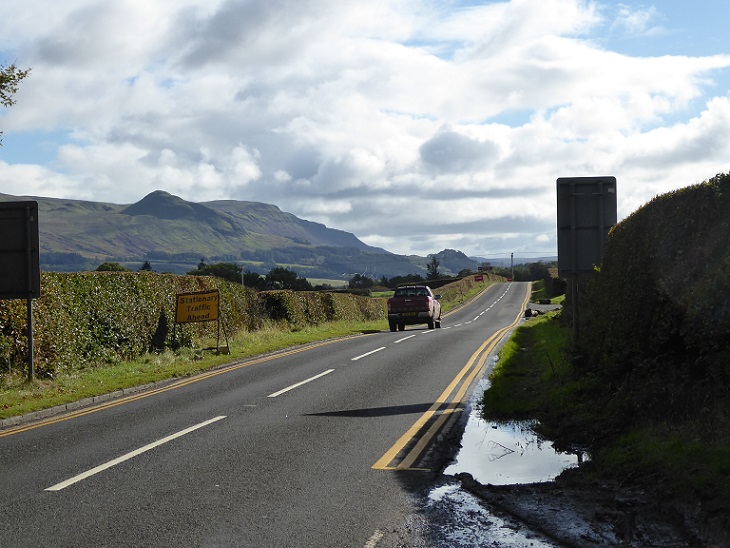
The next nearest place where it is legal to park involves an even longer walk along the main road.
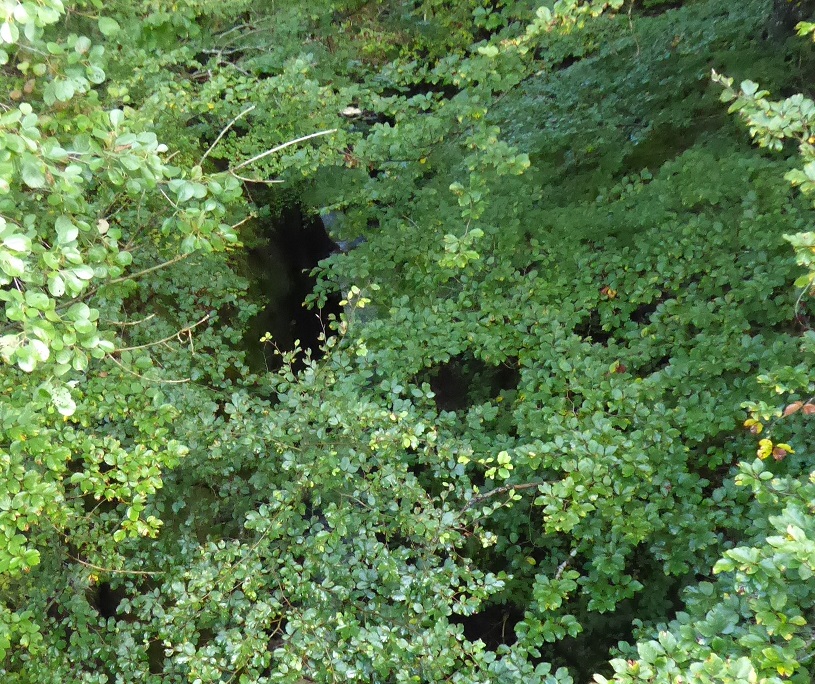
Unfortunately, for those wanting a safe view down the gorge, in summer there is almost nothing visible from the road bridge. That means if you want to see the gorge the only option is to try walking along one side or the other.
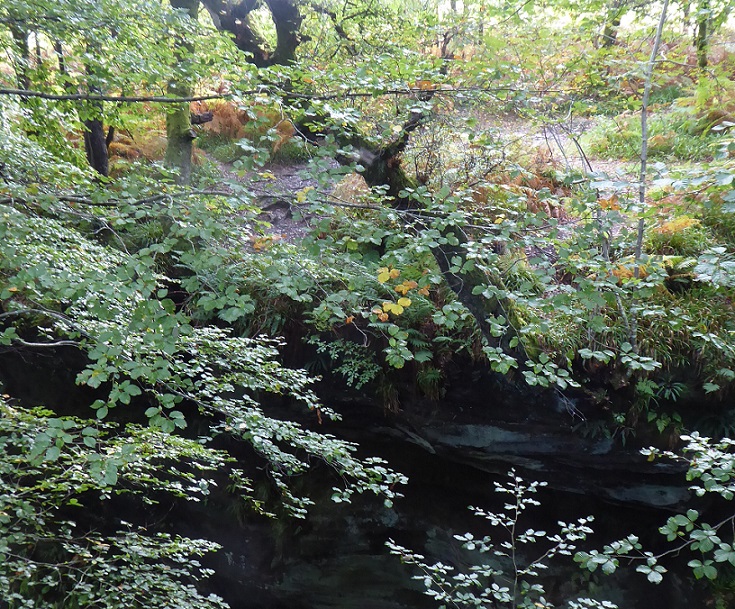
The nature of the gorge and the vegetation, however, means there are no “safe” viewing points from above. Anyone wanting to see the bottom necessarily has to take some risks. It is hardly surprising that, as with the man who fell last week, serious accidents occur.
There was a time when, notwithstanding our rights to take risks, those responsible for managing access saw it as their job to create appropriate infrastructure, including safe viewing points, for the general public in visitor hot spots like this. Austerity and neo-liberal ideology put paid to that.
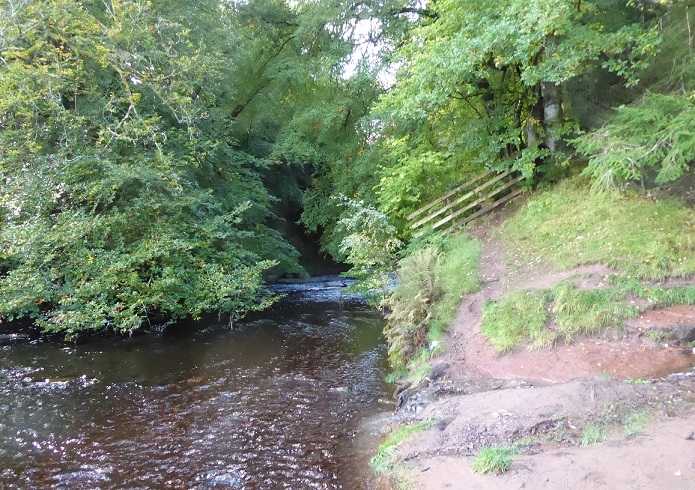
The other main option for viewing the gorge is to enter it from above or below, which appears to be what both the parties needing rescued did.
While there is a safe path round the fields to the bottom of the gorge, it is not signed, and many people take the more direct route. This takes a mud slope above the fence in the picture where there is a high risk that anyone without appropriate footwear or used to such ground could slip into the gorge.
Once at the bottom of the gorge, you are heading into the unknown. A great adventure – which is why outdoor centres bring children to experience gorge walking here in suitable conditions – but with its dangers. It shouldn’t surprise us that anyone determined to see the gorge or who is keen to show their photos on instagram many make the wrong choice when conditions are marginal. There is indicator to show when water levels are safe. It is thus almost inevitable that some people get into difficulties and call the rescue. It is these people that Stirling district of Police Scotland now want to brand as having committed a serious criminal offence.
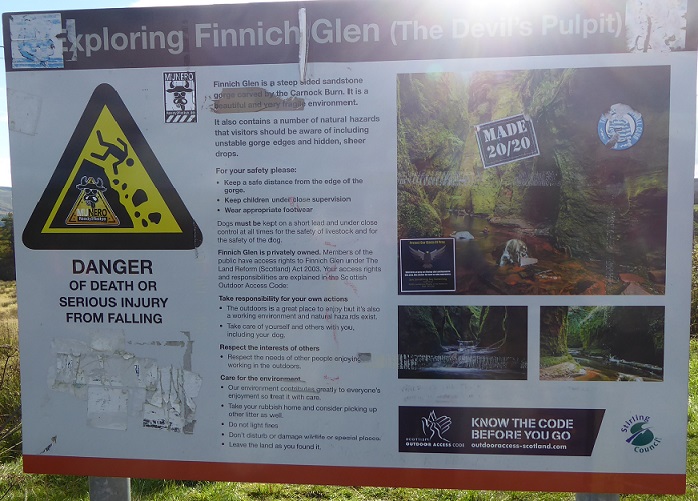
The old access sign, which explained the hazards of the site, was perfectly adequate before the glen became well-known. The problem now, however, is that the gorge has become so popular that the framework for managing access that is provided by the advice in the Scottish Outdoor Access Code is not, by itself, sufficient.
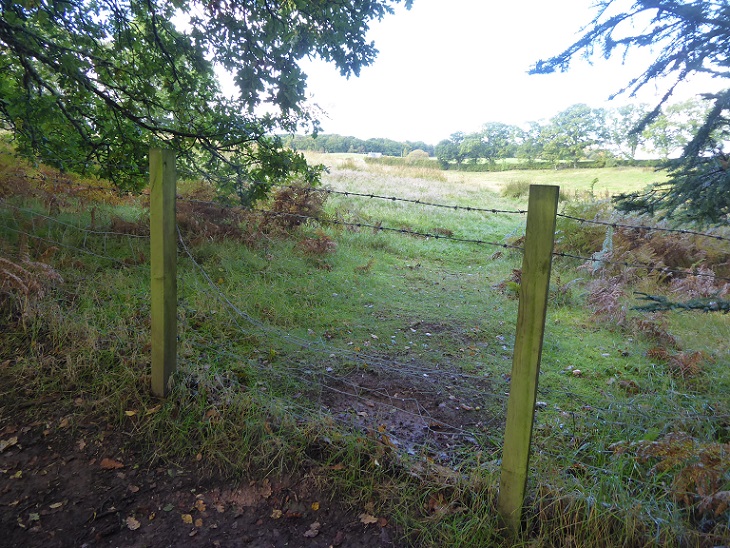
Having visited last October, I felt a lot of sympathy with the local farmer. His field, which is large, has effectively become unusable for farming purposes. In the absence of signage and stiles, the fence above the gorge has been broken in many many places. Useless for livestock or crops.
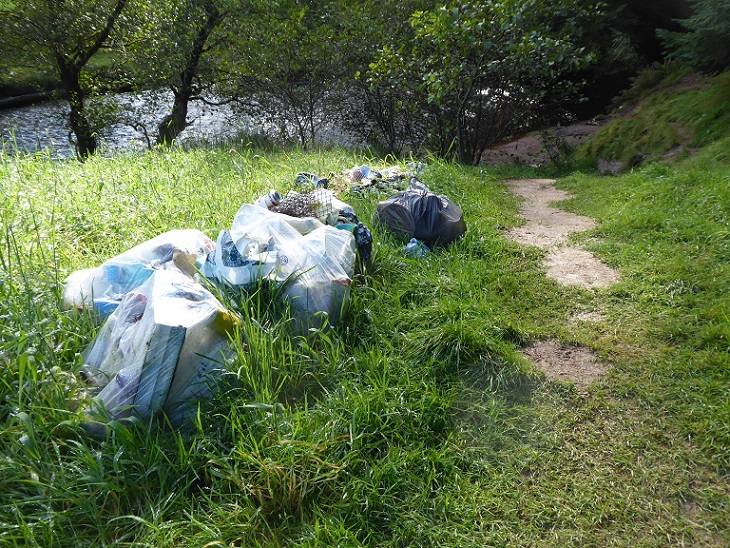
There are no bins and litter is a significant problem.
Unfortunately, however, instead of our public authorities paying the farmer to install appropriate infrastructure, managing visitors and compensating him for the loss of his field – or even buying it for the public good – he has been left to find his own solutions. Shortly after I visited, Stirling Council approved a major development for the site, contrary to their Local Development Plan, which will turn it into a major visitor “attraction” (see here). This will have serious implications for access rights. The question of whether people will still be allowed to enjoy the gorge for free is still to be decided.
In charging the two men with Culpable and Reckless Conduct, Police Scotland appear to have played into the hands of the farmer as developer. He can use the case to argue that the only way to stop people recklessly endangering others is to force them to pay to access the proposed viewing platform. Instead of our public authorities supporting access rights, they are allowing them to be privatised.
What needs to happen
The recent predicable accidents at Finnich Glen and the police response provide another good example of the consequences of our failure in Scotland to invest publicly in visitor infrastructure and the way that our public authorities are resorting to the criminal law to manage visitor. While the mis-use of the criminal law is worst in Stirling and the Loch Lomond and Trossachs National Park, if this goes unchallenged there are real risks that this could be extended to other parts of Scotland. It is surely time that all those who care about outdoor recreation and our access rights call for a halt to what is happening. More specifically:
- Police Scotland nationally should instigate an inquiry into how their Stirling District has been using the offence of Culpable and Reckless Conduct to criminalise outdoor recreation;
- The Procurator Fiscal’s office should come clean about how they have handled the other cases to date (I will submit FOI requests).
- The new Scottish Government should commission an independent review into the use of the Culpable and Reckless Conduct offence from a human rights perspective;
- If Police Scotland doesn’t act, consideration should be given to transferring their responsibilities for mountain rescue to the Fire and Rescue Service
A week ago the UK Parliament’s Joint Committee on Human Rights issued a report (see here) calling for every single Fixed Penalty Notice (FPN) issued under the Coronavirus Regulations during lockdown to be reviewed. The report has numerous implications for Scotland. Our public authorities should heed the final sentence in the summary:
“A heavy-handed approach to enforcement in such circumstances risks unjustly penalising a wide range of behaviour, in circumstances where there are insufficient safeguards in place to protect people from arbitrariness and unjustified interferences with basic human rights”.

Police Scotland have also been using the offence of “Aggravated Trespass” to threaten innocent walkers in the Highlands. It is time that the Chief Constable was ordered to appear before the appropriate Scottish Parliament committee to explain why his officers are misusing legislation both in relation to so called aggravated trespass and culpable and reckless conduct.
Outside of Scotland, I note too someone has just been charged for trespassing in Windsor Park – the law was changed in England to make entering certain royal properties a criminal offence; the Tories in England are not proposing to extend that to other land.
In view of recent promises by the Tory party saying one thing and doing another I’d be extremely worried with that proposal, ie; you don’t need to wear a mask became you must wear a mask, no covid passport or ID became covid passport and so on.
The Loch Lomond national park has been and is a disaster for access with its Rangers granted special constable powers and not afraid to use them .
Absolutely SUPERB that these idiots endangering emergency workers lives, their own and others in the area, feel the FULL and LEGITIMATE force of the law. Too many idiots that have broken laws during lockdown continue to act recklessly and they deserve all they get. Zero sympathy.
It’s about time all non government bodies rounded on the Scottish government and indeed police Scotland, as now I’m terrified and over cautious to not have an accident on a Munro , and had a few sore ones, slipped broke 3ribs when landed side ways on to a rock , another while using crampons and ice axe , lead guy hit a rock with his axe it bounced back he slid backwards threw the axe into the snow to stop as he spun the axe smashed into my elbow and he stabbed himself in the stomach… both occasions managed to get back to the car but now it’s getting to the point of are we going to be prosecuted for being late back to the car and having people concerned ? Where does this stop?
What is most disturbing in this and all mountain rescue incidents, is the total lack of consistency amongst Police officers and how they respond to all,callouts. Surely, every person who goes up any hill may, in some way, be inadequately prepared as who is to say what is and isn’t adequate: and that, say, becoming seriously cold because a casualty didn’t have sufficient insulating clothing was therefore ‘putting the lives of others at risk?
…and on a side;ine, most police officers attending rescue callouts are themselves inadequately prepared for the environment.
If we were to look at most callouts, we would probably still find that a majority are from folk who have become lost or injured from simple slips and trips which have created injury needing the help of MRT. If the slip or trip was possibly made more likely from a poor choice of footwear, is this reckless?
Does an open land journey now demand that you have to be above a certain standard of navigation skill before you are deemed as ‘safe’? – there could be a seriously high number of similar charges levelled against visitors to Ben Nevis if that’s the case.
The problem now though is that Mountaineering Scotland and Scottish Mountain Rescue are part funded by grants from the Scottish Government and both organisations can no longer act in any way that might jeopardise their funding; so speaking out in support of our hard won ‘freedoms’ to roam and journey across open high ground terrain is not in their interests when it conflicts with the reckless behaviour of officials like police officers.
Perhaps the Scottish Fire and Rescue Service or Scottish Ambulance Service should be charged with reckless behaviour when they get themselves into situations for which they have no experience nor the correct training and accordingly ask for MRT back-up?
I wonder if the Italian police should have charged me with recklessness resulting from my helicopter rescue on The Badile because, amongst other issues, the doctor found that I was seriously dehydrated – perhaps my recklessness was that I didn’t carry more of fluids to add to the 2Lts I already had.
Heaven forbid that adventure should become either a good time or a reckless endeavour merely on the whim of a police officer who is actually in no way qualified nor experienced to make a value judgement which could end-up giving someone a police record which may have to be declared on job applications.
Clearway signage (currently covered with black plastic) has been erected covering the entire length of the A814 along Loch Long from Whistlefield to Arrochar. Part of this is within the “Camping Management Zone” and the intent is clearly to get rid of the campers and fishermen who have used this area for many years.
I took a run around Argyll the other day and it is virtually impossible to stop let alone park. The profusion of signs official and unofficial makes it clear that visitors are not welcome; no parking, private, no access, no picnics, residents only…
Above Tighnabruaich a signposted “Picnic area” is an on road gravel layby on s steep slope!
Is it not simply the distance that was travelled that was considered “reckless” during Covid restrictions? It wasn’t about taking outdoor recreation opportunities but travelling serious miles to take them when others abided by the restrictions and stayed “local”.
Agree with JS and want to add the following if all the persons involved had adhered to the COVID restrictions no one would be in the position they find themselves in regards COVID Fines , Culpable and Reckless Conduct and other charges has mentioned.
Many incidents of requiring mountain Rescue in Scotland and elsewhere have put teams and team members in very difficult positions on call outs and dealing with situations that would not happen if selfish persons had stuck to the COVID Rules and not travelled out with the council area some in fact travelled 100 miles plus each way?.
For me think of the far bigger picture than the selfish persons who can only think of there own needs and have some respect for Emergency services including MRT who have to deal with the fallout when it goes wrong on to many occasions.
And if nobody ventured out at all in normal circumstances the same would apply. Or is this what you are advocating?
The risks willingly and knowingly taken by MRT, RNLI and other such bodies on rescues at any time are far more significant than the insignificant risk that they might catch Covid from any random asymptomatic rescuee – and nobody with Covid symptoms is going hillwalking!
The argument that any given activity is a significant infection risk on the basis that “you might have an accident and need help” is a desperate one and vanishingly unlikely to be a source of infection.
Well said.
Well said. We were all told to stay local but the minority of those the know better ignored the rules and ended up paying the price. There was plenty of campers and mobile homes on the move during the restriction as well.
Exactly, but some on here have a sense of exceptionalism.
Margret Ferrier MP been charged with the same for her wee trip
Hardly equivalent. Ferrier actually had Covid and knew or should have known she did. She visited various places used by others and travelled by public transport.
The hillwalkers didn’t have Covid and came into contact with no one except their rescuers, outdoors, something they never intended to happen.
That these two situations were considered equivalent in law is absurd. Clear and obvious risk versus negligible risk.
What is worse is that the current situation has nothing to do with Covid restrictions, the police in Stirlingshire seem to have decided that the precedent has been set and anyone who gets into difficulty can and should be considered for prosecution which as Nick says is entirely against all the principles of rescue organisations because it gives people in difficulty a serious disincentive to call for help promptly. There is no doubt if serious steps are not taken to reverse this stupidity then people will die unnecessarily.
Niall,
As you point out the 2 souls in question did not intend to get in trouble and require rescuing.
But those 2 souls, did they know their covid status?
After all is it a week until symptoms manifest in 2/3 of those infected while 1/3 do not show symptoms.
But hey ho you may know better that if they had passed on covid they did not mean to eh?
Just as a an aside would the say mixing of a number of middle aged and younger individuals from a diverse range of backgrounds been pleased to have caught covid when the did not mean to while rescuing rwo souls.
Perhaps it is the exceptionalism of the countryside where ther was no covid.
Hold on…
The risks of catching Covid are at present something like 1:45,000 for those NOT vaccinnated but if a person is infected those risks will be greater where there is close personal contact. The most such contact in the recent Finnich Glen cases will have involved the man taken to hospital. Are you calling for him too to be charged with Culpable and Reckless Conduct?
So true. Sadly the police can sometimes be unaware of the nuance of the law and I think that these charges are inappropriate whether breaching covid or otherwise. Culpable and reckless conduct, by definition, has to involve an element of recklessness (not simple failure to take care) that is simply not present in these scenarios.
The Stirling Observer article of 07/05/21 states that the most recent ‘reckless and culpable’ charge was made for a rescue that took place on 28 April this year, meaning that the men charged were not breaking lockdown restrictions by being in the glen.
It is this recent case that most worries me – the two previous incidents involved lockdown-breakers but the Finnich Glen visitors were charged during a time when tourism was (at least partly) operational again. So there is nothing to suggest that the police won’t behave the same way once we are out of the pandemic.
Cyclical me perhaps but perhaps the Divisional Commander for Police Scotland Stirling Division is seeking a promoted post and further career advancement through demonstrating a “tough, uncompromising” local policing approach?
When did it become acceptable in Britain for volunteer rescue organisations to gift themselves the right to dictate to the general public, how people must behave when in the outdoors. Who do they imagine gave them any authority whatsoever, via any democratic process or statute to enforce their viewpoint on others.?
I just ask, because we are living in dangerously authoritarian times, ( of necessity , principally within urban areas) to help control a pandemic. This moment in history should never have been used as “green light” for such measures. Those individuals who routinely wish to be approached to assists the ‘collect up’ after mistakes are made have no more justification to empower their viewpoint than any other “lobby group”. It was one thing when RAF mountain rescue teams used to recover the injured and lost from hillsides..(Indeed.it became an essential part of their training in days when aircraft were less reliable). But now the public must obey local chiefs in RNLI stations, mountain rescue station leaders , and even have call centres within insurance companies giving advice to the public about what is appropriate. . We now see the formal ‘in sport’ governing organisations , themselves beholden to National funding and local authority grants, seeking to pronounce about how the long standing freedoms implicit in the right to roam may be exercised.
We live in very selfish and smug, self righteous times. The Public should resist at every interface the damage inflicted to Psyche by this nanny state ‘we know what’s good for you’ attitude. .
Hi Tom, I have been doing some further investigation and I don’t believe the Lomond MRT had any say in this charge, it appears it was a Police Scotland decision. It would be good though if the many MRT members who were concerned about this were able to speak out but, being dependent on the police in several respects, they probably are not in a position to do so, Nick
Please
Of course the charges have nothing to do with MRT.
The police will have called out the MRT as you well know.
Why would a member of MRT not speak out against or for charges other than they have not often passed judgement on those they are rescuing? Are you suggesting a gagging order from MRT.
I was suggesting the opposite, that the MRTs should speak out against the use of this charge as its threatens the whole ethos of mountain rescue
any court result for the two men being charged in Finnich Glen rescues?
Thanks for the reminder, I have started checking all three cases and once I have found outcomes will do another post, Nick